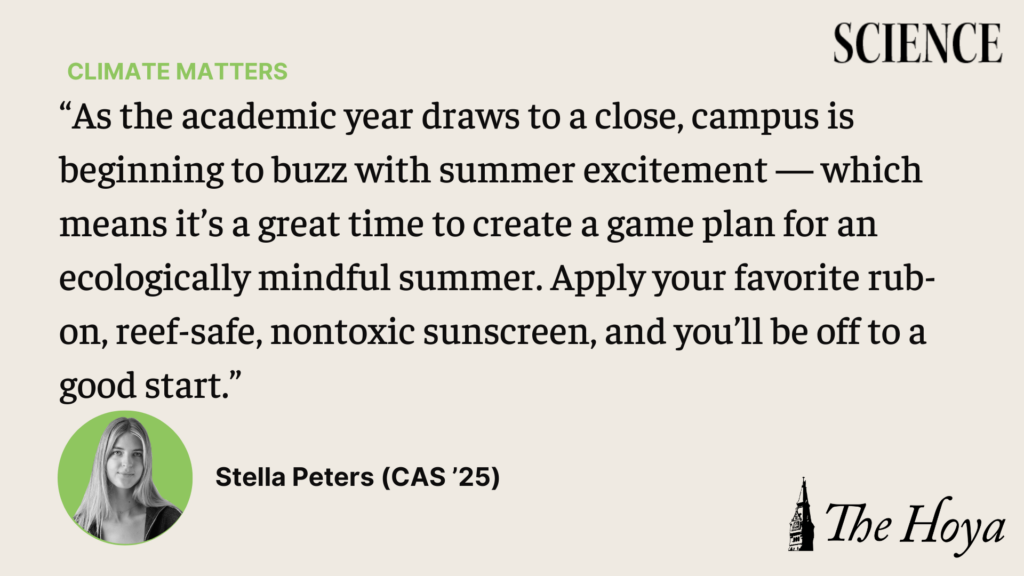As the academic year draws to a close, campus is beginning to buzz with summer excitement — which means it’s a great time to create a game plan for an ecologically mindful summer. Apply your favorite rub-on, reef-safe, nontoxic sunscreen, and you’ll be off to a good start.
For those of you planning to restore yourselves with the comfort of home this summer, you have the opportunity to cultivate enduring, sustainable practices, like planting food and teaching family or roommates how to compost.
I’ll start by discussing air conditioning, a system that both guzzles energy from the grid during peak hours and releases greenhouse gasses. Apart from spending money on more efficient cooling systems like swamp coolers, there are countless alternative ways to cool down your home that won’t cost you anything. Open your windows at night, close blinds during the day, open windows that are opposite each other to cross-ventilate the room and turn on a fan that’s close to the ground to circulate cool air. Also, during summer months, set your ceiling fan blades to spin counterclockwise to push air down and create a breeze.
Whether you are traveling or at home, summer is also a great time of year to frequent farmers markets. Grab your reusable bags and go chat with farmers, if there are some in your area. I promise that the locally grown strawberries into which you sink your teeth at the farmer’s market will taste much more delectable — and have a lower carbon footprint — than supermarket produce.
If you want to get your hands dirty instead, it’s time to grow a garden. If you don’t have space for a full-blown garden, you can grow food in pots on a deck or a porch. Or, if you live in an apartment, use an indoor tower garden or herb-growing kit to supplement grocery store runs. However you decide to garden, it’s important to compost food waste that would otherwise waste away in the landfill. Countertop composters are easy to find, and you can repurpose the nutrient-rich soil for use while gardening.
For those planning to jet set during the warmer months, it may seem difficult to reduce your environmental footprint while ceaselessly slapping your sandals on jet bridges and cobbled streets. Luckily, I have handy strategies that you can implement on the fly.
Global air travel for tourism is responsible for eight percent of global emissions, and this number is rising each year. As travelers, we are responsible for offsetting this impact as much as possible.
The airline you choose also matters. Keep yourself up to date about which airlines are leading the charge to make their operations more green before choosing where you book your seat. When you fly, you can help minimize the destruction of your aviation footprint by purchasing carbon offsets through resources like Gold Standard while you wait for the plane to take off, if you have the capacity. Or better yet, take a train.
Creative ways to monitor your environmental footprint are even more abundant once your plane lands. If you are a shopper, research vintage stores to explore — different countries have amazing vintage finds that are more unique, and sometimes more economical, than offerings from large retailers. Shop vintage to find a new fall wardrobe without breaking the bank or damaging the planet.
If you’re tired of shopping, maybe it’s time for an ecological field trip. In Stanley Tucci’s Italian food exploration television show “Searching for Italy,” he interviews sustainable farmers in Citta della Pieve who practice “agriconcura” — farming with care. By going off the beaten path to discover where Italian regenerative agriculture is flourishing, Tucci shows how traveling can be a great opportunity to explore unusual and forward-thinking ecological practices. Take advantage of the privilege of traveling by supporting and learning from local ecological trailblazers in the lands you visit. Look beyond the city and visit agricultural areas, diverse landscapes, WWOOF locations, hiking trails and nature preserves.
In between adventures, when you’re packing your work lunch or your airplane snacks, don’t forget reusable utensils, containers, straws and bottles. Take advantage of the warmer weather — walk to your destinations (visit a local library to borrow a beach read) and hang dry your laundry. Opt for an ice cream cone instead of a disposable cup, and savor the summer feeling of cookies and cream dripping down your arms and onto the hot pavement.
Finally, think about how to support community ecology during your time off from school. Often, volunteer-based programs like food banks experience a lapse in the summer, when demand is highest because school meals aren’t available. This summertime “volunteer slump” also affects homeless shelters, blood banks and tutoring, among other things — give back by volunteering and contributing to organizations that sustain your community.
HAGS — have a GREEN summer, my fellow sustaina-bulldogs. See you in the fall.









